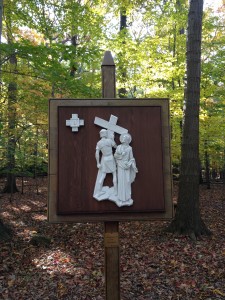 It’s been a selfish Lent, and I liked it that way.
It’s been a selfish Lent, and I liked it that way.
While the rest of the Catholic world pined and prayed away their 40 days on sacrifice, obligation, “giving it up to the Lord,” and fasting on their human favorite goodies like alcohol, chocolate, and bad words, I’ve done something I’ve never done before: I made a whole new life for myself.
That’s right. I put into action the plan I’ve had for years and finally did my 40 days of genuine ministry in the topic that draws me ever closer in enraged fascination: sexual violence. It’s time, it being Holy Saturday, and the Easter Vigil tonight, to share what I’ve done, how I did it, and why I’m giving up giving things up for Lent in lieu of putting into action a new course of living.
One of the first memories I had of Lent as a child was being given a cardboard box to donate all my coins and extra change during the forty days leading up to Easter. Because of my late February birthday, I always received money in the mail and carried around a guilty conscience that I should give my money into the donation box. I did. Every year. Whatever birthday money I received, I folded it up and pushed it through the skinny slot so children in some other part of the world could eat for the next few months. The unknown person got a bowl of rice, I got my birthday cake and mom’s homemade lasagna. Seemed like I should be happy with that deal.
But I wasn’t. And I wasn’t a spoiled child. I rarely received money and I didn’t spend it. There were no allowances to save, so anytime money came across my way, I would save it for something special that I wanted. But I dreaded Lent because of it’s inevitable alignment with my birthday. It was the one day of the year that I wanted to do what I wanted, a day that I could do and be all the things I wanted with no apology or reason. But Lent curbed that for me as a child. This was my introduction to Lent and to the concept of charity: it forced me to give up the one day I waited for all year.
Lent is often focused on the solemnity. The suffering. The human darkness that temporarily triumphs the supposedly inherent light in us. The words ring like bells repent, make way, offering, repent, sacrifice, repent, repent, repent.
A lifetime of growing up Catholic with Catholic rituals, prayers, and worship service formed my conscience to be acutely and painfully aware of suffering. It wasn’t until natural adult maturation that I begun to understand Lent in the context of my own strengths and limitations: charity never made sense to me. Giving the extra never made the impact that I always wanted to see.
For me, the depth of poverty and corrupt infrastructure of leaders and politicians evaporated whatever hope I experienced from volunteerism and random acts of kindness. Don’t get me wrong: I believe in the necessity and power of charity and sharing resources with the marginalized. But 35 Lenten seasons later, I no longer found it moving to simply stop drinking soda and going to mass an extra day of the week to feel a deeper connection to something Larger than myself.
 When I began the Dear Sister anthology, I shied away from revealing that much of it came from my desire to do something with my faith. The focus on the anthology is on survivors and their stories, admitting or narrating my story felt and feels distracting. Beside the point. Needlessly detailed. But in processing it these past few months, it’s essential to stop hiding faith and begin living it in the most authentic way we can imagine. Lent, for me, needed to go beyond sacrifice. It had to be about creating something.
When I began the Dear Sister anthology, I shied away from revealing that much of it came from my desire to do something with my faith. The focus on the anthology is on survivors and their stories, admitting or narrating my story felt and feels distracting. Beside the point. Needlessly detailed. But in processing it these past few months, it’s essential to stop hiding faith and begin living it in the most authentic way we can imagine. Lent, for me, needed to go beyond sacrifice. It had to be about creating something.
I formatted the book tour to reveal my innermost longings about life and faith: activating community members to care. The dialogues were facilitated in a way that I hoped to radicalize the notion that non-surviving community members and allies were, essentially, the heart of transformation. Their ability to listen, believe, and love is the only way forward in eradicating sexual violence. What other way could there be? And yet, over and over, the communities did not understand this. Still, the onus and responsibilities of transforming the world to a more peaceful and just existence fell on the ability of survivors to tell their story and be labeled “strong.” Their choice to report, not ability to heal, is the focal point of justice. Their health and safety is secondary to their willingness to cooperate with state’s notions of jurisprudence.
For this Lent, I decided to create the conversations that I thought would uplift the survivors and help heal communities so they are stronger and able to more readily address the issue of power and sexuality in their communities.
Perhaps it was my unwillingness to give up meat on Fridays, or maybe it was the my shrinking belief in the veracity of the gospel, but I decided to create a new Lenten practice for myself and speak what I wanted to speak, step out of the cave of fear and assumption that someone else would do the work and just do it myself. I had to. Not only was the orthodox Lenten practice boring me, it was killing my spirit. I decided to take this Lent to live the way I wanted my life to be lived: truly for others.
I made this Lent about me. Me serving others, not me giving up pleasures. In some ways it was selfish. And it never felt so good. A new Lent made a new Easter. The renewal I experienced was not shiny or even pretty. Folks forget that rising from the dead isn’t all glory for the rest of us. Death’s stench lingers until we fully escape the tomb, and only than does the open wind cleanse us.
I am emerging from this tomb and leaving behind tattered garments of a woman who worked for the church, who prioritized the feelings of others over the well-being of the marginalized. My Easter is not of sunshine and sweetness, but of an earthy grit that comes from digging out of that grave, a smell of soil and sweat, and even a little bit of brokenness, still. It is an Easter of joy, of smeared dirt marks on my face, and exhaustion beyond bodily fatigue.
This is me crawling out of my cave.
